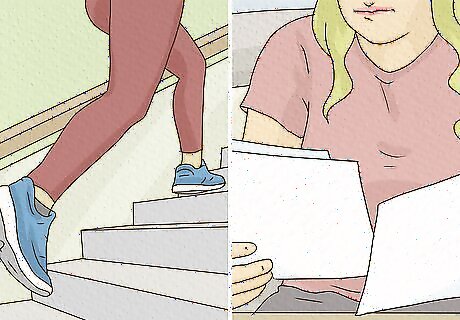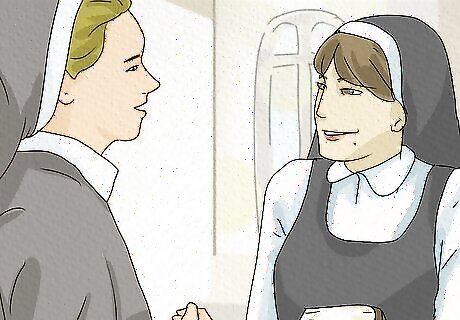
views
- To become a nun, you must be baptized Christian, at least 18 years old, unmarried, and have no dependent children
- Visit a vocation counselor, who’ll help you decide if a nun's life is right for you and choose a religious community.
- Join a community as a novice, and progress through the formation stages until you take your final vows.
Fulfilling the Requirements

Get baptized as a Christian. Most religious orders of nuns require their candidates to be baptized as a Roman Catholic. Baptism initiates a person into the Catholic faith, preparing them for a host of possible vocations. After baptism, you’ll receive other sacraments, like taking communion or getting confirmed, which affirms your faith as a Catholic. While most orders are Catholic, there are orders of other Christian denominations, like Protestant, Anglican, or Orthodox nuns. Whichever order you choose, you must be baptized in the according denomination. You don’t need to get baptized to become a Buddhist nun, and the process is much the same as becoming a Buddhist monk.

Live as a single, widowed, or annulled woman. In order to be considered for life in a convent, you must be a woman who doesn’t have any outstanding vows. This means you must either be unmarried, or your married partner has passed away. If you’re divorced, speak with a priest to have your marriage annulled, which is a process that dismisses marriage vows in the eyes of the Catholic Church. According to the Catholic Church, nuns have a primary relationship with God, meaning they can’t have vows to other people, which might get in the way of their devotion.

Be either 18 or 21 years old. In the past, many nuns joined convents at very young ages. Nowadays, most orders have stricter rules. Typically you’ll have to wait until you’re either 18 or 21 years old. In addition, many orders have maximum age requirements, which typically fall between 40-50 years old. In general, most religious communities encourage their members to have some type of college education. Having at least a BA is preferable, but not necessary. Life experience, including professional experience, is also a plus. There are no particular certifications or licenses you need to become a nun, other than being of-age.

Raise your children until they’re independent. If you have children, they need to have left home. Plenty of nuns do have children, but your obligations to your children typically can’t interfere with your obligations to God and the convent. Most orders require your kids to be older than 18.

Practice good physical and mental health. It might seem surprising, but most orders look for candidates who can devote both their mind and body to the lifestyle. As a nun, you may have to do physical labor or mental tasks like teaching. What good health looks like varies from convent to convent, but you’ll generally need to be able-bodied and without any debilitating mental illnesses. If you have any doubts, contact a member of your desired community to discuss. Some may make exceptions for enthusiastic candidates. Many convents also require that their candidates pay off their financial debts, so that the convent doesn’t assume any existing debts.
Discerning Your Vocation

Pray and ask God to reveal your vocation. The first thing most nuns will tell you to do is pray. Becoming a nun is a huge decision, and every nun makes that choice after a whole lot of prayer. Contemplate your spiritual life and ask yourself what you want to accomplish as a nun, why you want to become one, and if it’s the best thing for your spiritual development. An answer may not come immediately, or even clearly, and that’s okay! Keep praying while you move forward; you may receive your answer later in the process.

Speak to a trusted family member, friend, or spiritual mentor. While becoming a nun is a decision you make for yourself, it’s not one you have to make alone. Talk to someone close to you and tell them you’re considering a more religious life. Ask for their advice—Do they see this as a good option for you? Will they be there to support you as you move forward? An outside voice can be a huge boon during this process.

Work with a vocation director to find a community for you. Use an online tool like NCDVD Vocation Director Locator to find resources near you. A vocation director is a specialized advisor that helps prospective religious people explore their options. A vocation director will connect you to religious communities, help you discern your calling, and guide you through the initiation process. They’ll also help you decide which kind of spiritual community is right for you: Contemplative communities (nuns) focus on prayer. Their lifestyles are more serene, meditative, and insular than their apostolic counterparts. Traditional apostolic communities (sisters) work in education and healthcare. Many sisters can be found teaching in area schools or helping at hospitals and other healthcare facilities. Non-traditional communities (laypeople) also do service for others, but can be found working with the homeless, incarcerated, or those with HIV/AIDS.

Talk to nuns to learn more about their daily lives. Contact your local priest and ask him to connect you with a local convent or spiritual community to inquire about vocational life. The more mentors you can get a hold of, the better. And since every religious community is different, you'll gain a clearer understanding of what it's like to live as a member of that particular community. Many religious communities have websites that give an overview of their activities and lifestyles. Search the internet for a community near you, and take advantage of any contact information listed on their site. Alternatively, browse a database like Cloistered Life to learn more about active communities.

Look into communities that offer careers based on your interests. Cloistered communities don’t typically have “jobs” per se, but might do things like sell honey or home-grown crops to support themselves. Apostolic communities, like the Dominican sisters, typically teach in schools or provide other public services. Different communities might place you in different jobs, so consider what kind of work you might want to do (or not do) as a nun. Usually, nuns don’t make their own money and are supported by the convent. Some communities, however, might offer their members a modest stipend.

Attend a retreat or an open house at a religious community. A glimpse inside the walls of a convent will give you a much fuller picture of what your life there may look like. Find an open house or community outreach day to attend to learn more about any given spiritual community, and if their way of life is right for you. The Institute on Religious Life lists upcoming retreats and social opportunities for a number of religious communities, and provides a number of other discernment tools, as well.
Taking Vows

Apply to a community that you connect with to become a pre-postulate. Once you’ve decided that life as a sister or nun is right for you, work with your vocation advisor to submit an application to your desired community, or submit an enquiry via the community’s mailing address or web page. The application process is different for every order, but by now you’ll have interacted with the order enough to have a firm grasp of it. During your pre-postulancy, both parties will work together to more seriously explore if the community is a good fit for the candidate with events like interviews and retreats. The time frame for this process varies by order, and can take anywhere from 2 weeks to a few years.

Enter the postulate stage to start living with the community. After the order has decided you’re a good fit, they’ll invite you to become a formal candidate. In this stage, candidates live and work part-time with the spiritual community, but still maintain their outside life. The candidacy process usually lasts 6 months to 2 years. At any time in the process, either you or the order can choose to part ways. After this stage, you’ll have another opportunity to either keep moving forward, or part ways with the community if it doesn’t feel right for you.

Enter the novitiate to learn about the vows the community takes. At this stage, you live, pray, and work full-time within the community. You earn the title “Novice” or “Sister,” and undergo at least 1 year of intense prayer and study to learn more about the vows a fully-fledged member makes to decide if they’re right for you. Some congregations of sisters ask a Novice to choose a saint's name, upon taking your public vows, but not all. You may also keep your Baptismal name.

Take your temporary vows to make another step into the community. A junior religious sister takes temporary vows that are renewed each year until they take their full, final vows. These temporary vows include a vow of poverty, chastity, and obedience, as well as whatever else the particular order specifies. This stage can last for several years; it’s up to the leaders of the order to decide when a junior sister is ready for full vows. These vows mean that a junior sister won’t have her own money, will abstain from sex, and will follow the teachings of Catholicism as closely as possible. Upon taking temporary vows, junior sisters of many orders cut their hair short, wear full religious garb, and name themselves after a saint.

Take your final vows to become a fully-fledged sister. If both you and your religious leader have decided you’re a good fit for the community, it’s time to take your perpetual vows. These are similar to temporary vows, except, as the name implies, are permanent. You’ll have a full ceremony in which you’re given your proper religious clothes and renew your commitment to the community. There are a couple of exceptions to this style of vows: the Jesuits' first vows are their final vows and the Sisters of Charity only ever take renewable vows.















Comments
0 comment